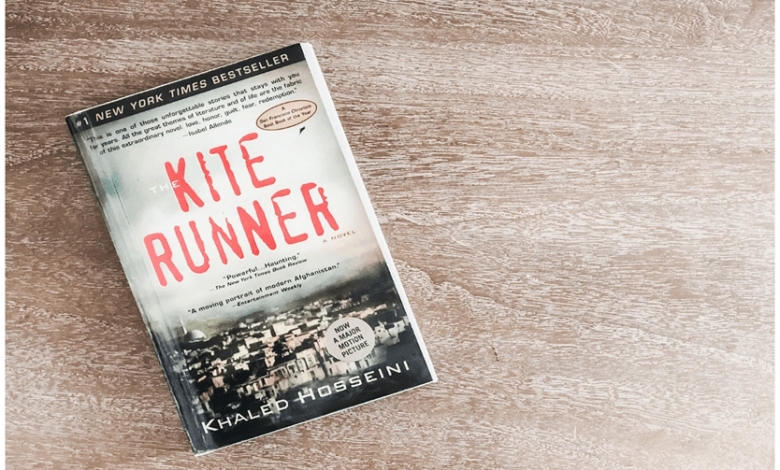
“The Kite Runner” is a novel by Khaled Hosseini published in 2003. It tells the story of Amir, a young boy from Kabul, Afghanistan, and his journey to redemption. Before moving towards The kite runner Themes, here is The kite runner short summary:
The story starts with Amir’s childhood in Kabul, where he grows up with his best friend Hassan, the son of his father’s servant. Despite their differences in social status and ethnicity, the two boys are inseparable, bonded by their love for kite flying.
However, one day, a traumatic incident changes their friendship forever. Amir witnesses a brutal attack on Hassan but does nothing to stop it, leading to a sense of guilt that haunts him for years. Eventually, Amir and his father flee to the United States, where Amir tries to forget his past and start a new life.
Years later, an old family friend contacts Amir with a chance at redemption. He offers Amir a chance to return to Afghanistan and make amends for his past mistakes. Amir takes this opportunity and returns to his homeland, where he discovers the truth about his family and his country’s turbulent past.
“The Kite Runner” is a powerful story of friendship, betrayal, guilt, redemption, and the search for identity in a changing world. It provides an insight into the culture and history of Afghanistan while exploring universal the kite runner themes that resonate with readers around the world.
A Case of Exploding Mangoes Summary, Analysis & IMP Themes
Major The Kite Runner Themes in the Novel:
Khaled Hosseini’s “The Kite Runner” is a novel that explores complex themes of loyalty, betrayal, guilt, redemption, and the impact of political turmoil on personal relationships. Through the journey of its protagonist Amir, the novel highlights the struggle to find oneself amidst social, cultural, and political changes.
Friendship and Betrayal:

The theme of friendship and betrayal is a central aspect of “The Kite Runner.” Amir and Hassan’s friendship is unique because it transcends the social, ethnic, and religious differences that exist between them. Despite their disparate backgrounds, the two boys form a deep and meaningful bond, sharing a mutual love for kite flying and storytelling. However, their friendship is ultimately destroyed when Amir fails to intervene in Hassan’s rape. The betrayal not only severs their friendship but also has a profound impact on both Amir and Hassan’s identities and sense of self-worth.
Throughout the novel, the consequences of betrayal are explored, revealing how it can have far-reaching consequences on a person’s relationships and emotional well-being. For Amir, the guilt and shame he feels over his betrayal of Hassan continue to haunt him well into his adulthood. He spends much of his life trying to make amends for his past mistakes, seeking redemption through various means. The novel ultimately offers a message of hope, showing that even the most devastating of betrayals can be overcome with time and effort.
Related Quotes:
- “For you, a thousand times over.” – This is a line spoken by Hassan to Amir during a kite-fighting tournament, symbolizing their unbreakable bond of friendship.
- “I flinched, like I’d been slapped. My heart sank and I almost blurted out the truth. Then I understood: This was Hassan’s final sacrifice for me.” – This quote highlights the moment when Amir witnesses the attack on Hassan but fails to intervene, leading to a sense of guilt and betrayal that haunts him for years.
A Thousand Splendid Suns: Summary, Analysis & IMP Themes
Redemption and Forgiveness:

Redemption and forgiveness are central the kite runner themes in “The Kite Runner,” which explore the power of self-forgiveness and forgiveness from others. Amir’s journey towards redemption begins with acknowledging his past mistakes and taking responsibility for his actions. Throughout the novel, Amir struggles with the guilt and shame of his betrayal of Hassan, and it’s only by returning to Afghanistan and making amends that he’s able to start the process of redemption.
One of the most powerful moments in the novel is when Amir rescues Hassan’s son, Sohrab, from the clutches of the Taliban. This act of courage and selflessness represents the culmination of Amir’s journey towards redemption, as he finally takes action to right the wrongs of his past. Through this act, Amir is able to find a measure of peace and begin to forgive himself for his past mistakes.
Related Quotes:
Here are some quotes from “The Kite Runner” that illustrate the themes of redemption and forgiveness:
- “There is a way to be good again.” – This quote, spoken by Rahim Khan to Amir, represents the beginning of Amir’s journey towards redemption.
- “But it is never too late to mend what is broken.” – This quote, also spoken by Rahim Khan, highlights the importance of taking responsibility for one’s actions and making amends.
Father-Son Relationships:
Father-son relationships are a significant theme in “The Kite Runner,” exploring the complex and sometimes fraught relationships between fathers and sons. The novel focuses on the relationship between Amir and his father Baba, and the central conflict of Amir’s struggle to win his father’s approval. Baba’s expectations of his son are shaped by cultural and societal norms, and Amir often feels that he falls short of his father’s expectations.
Throughout the novel, Baba’s influence on Amir’s identity and values is explored. Baba is a flawed but deeply human character, and his relationships with both Amir and Hassan demonstrate the importance of father figures in shaping a person’s sense of self. Baba’s actions and values often contradict his words, and it’s only after his death that Amir begins to understand the depth of his father’s love for him.
The theme of father-son relationships is further explored in the novel through the characters of Rahim Khan and Sohrab. Rahim Khan serves as a mentor and father figure to Amir, helping him to understand his past and find a path towards redemption. Sohrab, Hassan’s son, becomes a surrogate son to Amir, and their relationship represents a chance for Amir to break the cycle of betrayal and seek redemption for his past mistakes.
Related Quotes:
Here are some quotes from “The Kite Runner” that illustrate the theme of father-son relationships:
- “Children aren’t colouring books. You don’t get to fill them with your favourite colours.” – This quote, spoken by Rahim Khan to Baba, highlights the importance of allowing children to develop their own sense of identity and values.
- “I see now that Baba was wrong. There is a God…There has to be. And now I’m going to prove it to you.” – This quote, spoken by Amir to Rahim Khan, represents his attempt to reconcile his past with his beliefs and values.
Old China Summary and Analysis (Charles Lamb)
Culture and Tradition:

“The Kite Runner” is set in Afghanistan during a time of great political upheaval. The novel highlights the impact of war, violence, and cultural changes on personal relationships. The story of Amir and Hassan is a microcosm of the larger political and social tensions in Afghanistan. The novel portrays the clash between traditional and modern values and the challenges of reconciling the two. Amir’s journey to find his identity is also a journey to reconcile his Afghan heritage with his American upbringing.
Related Quotes:
- “Afghanistan is the land of Pashtuns. It always has been, always will be. We are the true Afghans, the pure Afghans.” – This quote illustrates the clash between traditional and modern values in Afghanistan, and the societal expectations that shape people’s identities.
Existence Precedes Essence: Embracing Freedom and Responsibility
The Kite Runner Analysis
What is Kite Runner really about?

“The Kite Runner” is a novel about friendship, betrayal, redemption, and forgiveness set against the backdrop of the tumultuous history of Afghanistan. The story revolves around Amir, a young boy from a privileged Pashtun family, and his childhood friend Hassan, a Hazara boy from a lower social class who works as Amir’s servant. Despite their differences, Amir and Hassan share a deep bond forged through their shared love of kite running.
However, the friendship is shattered when Hassan is brutally raped, and Amir fails to intervene, haunted by his own fear and insecurity. The guilt and shame over his betrayal of Hassan continue to haunt Amir throughout his life, even after he and his father flee Afghanistan and start a new life in America.
What is the Main Massage of “The Kite Runner”?
The main message of “The Kite Runner” is that one’s past mistakes and traumas can have a lasting impact on their life, but redemption and forgiveness are possible. The novel shows how the characters, particularly Amir, struggle with guilt and shame over past transgressions and how these emotions can affect their relationships and sense of self-worth. However, the novel also emphasizes the power of redemption and forgiveness in healing these wounds and restoring relationships.
Another important message of the novel is the importance of cultural and societal contexts in shaping relationships and individual identities. The novel explores themes of social class, ethnicity, and religion, and how these factors can influence the way people interact with each other and see themselves. It also highlights the challenges faced by immigrants and the importance of maintaining connections to one’s cultural heritage.
why was “The Kite Runner” banned?
“The Kite Runner” has been banned in some countries and schools for its portrayal of sensitive themes such as rape, violence, and sexuality. Some conservative groups have also objected to the novel’s use of profanity and its depiction of Islam and Afghan culture.
In some cases, the book has been challenged for its depiction of homosexuality and the controversial nature of its content. However, many defenders of the novel argue that its sensitive portrayal of these the kite runner themes is necessary to accurately depict the complexities of Afghan culture and history, and to explore universal themes of friendship, betrayal, and redemption.
Despite these challenges, “The Kite Runner” remains widely read and acclaimed for its powerful storytelling and emotional depth.
What does “The Kite” symbolize in the story?

In “The Kite Runner,” the kite symbolizes various things throughout the story. At first, the kite represents a connection between Amir and his father, Baba. Amir’s love for kite flying is one of the ways he tries to gain his father’s approval and affection. In this sense, the kite is a symbol of their relationship and the way it evolves throughout the novel.
Later in the story, kite flying takes on a more significant role in the plot as Amir and Hassan compete in kite flying tournaments. The kite becomes a symbol of victory and triumph, representing the boys’ hopes and dreams. The kite also symbolizes freedom and escape from the difficult circumstances in which they live.
However, the kite also becomes a symbol of betrayal and guilt for Amir after Hassan is attacked while retrieving the kite. The kite that once represented their friendship now serves as a reminder of Amir’s betrayal and his failure to stand up for his friend. In this way, the kite symbolizes the complex nature of human relationships and the consequences of our actions.



